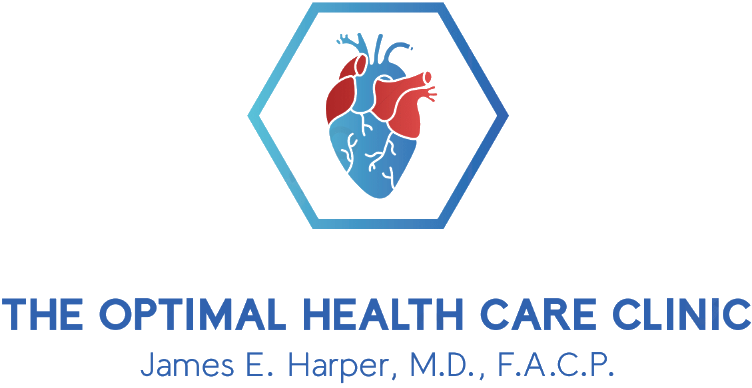High cholesterol is a common but serious health issue that can quietly increase your risk for heart disease, stroke, and other cardiovascular conditions. The good news is that in many cases, cholesterol levels can be managed and even improved through thoughtful dietary and lifestyle changes. At The Optimal Health Care Clinic, patients are guided through a personalized approach that emphasizes long-term wellness and prevention, starting with practical, sustainable habits.
Understanding Cholesterol
Cholesterol is a waxy, fat-like substance that your body needs to build cells and produce hormones. While cholesterol is essential to health, too much of the wrong type can be harmful. Cholesterol travels through your bloodstream in two types of carriers:
- Low-Density Lipoprotein (LDL): Often called “bad cholesterol,” high levels of LDL can lead to plaque buildup in the arteries.
- High-Density Lipoprotein (HDL): Known as “good cholesterol,” HDL helps remove LDL from the bloodstream.
When LDL levels become too high, or HDL levels too low, the risk for blocked arteries, heart attacks, and strokes increases. Many people with high cholesterol don’t experience symptoms, which is why routine check-ups and blood tests are so important.
The Role of Diet in Cholesterol Management
One of the most effective ways to manage high cholesterol is through diet. Making intentional food choices can help lower LDL levels and improve HDL levels over time.
1. Reduce Saturated and Trans Fats
Saturated fats, found in red meat, full-fat dairy products, and many processed foods, can raise your LDL cholesterol. Trans fats, often found in baked goods, fried items, and margarine, are even more damaging and should be avoided completely.
2. Add More Fiber-Rich Foods
Soluble fiber helps reduce the absorption of cholesterol into the bloodstream. Foods like oats, beans, lentils, apples, and citrus fruits are excellent sources of soluble fiber and support overall heart health.
3. Increase Omega-3 Fatty Acids
Omega-3s don’t lower LDL directly, but they help reduce triglycerides and protect the heart. Sources include fatty fish such as salmon, mackerel, sardines, as well as flaxseeds and walnuts.
4. Limit Added Sugar and Refined Carbohydrates
Excess sugar and highly processed carbs can lead to increased triglycerides and lower HDL levels. Choosing whole grains, fruits, and vegetables helps regulate blood sugar and supports balanced cholesterol levels.
Lifestyle Habits That Make a Difference
Along with a healthy diet, lifestyle habits play a major role in cholesterol management. Small, consistent changes can lead to lasting improvement.
1. Be Physically Active
Regular exercise helps raise HDL cholesterol and lower LDL cholesterol and triglycerides. Aim for at least 30 minutes of moderate activity, such as brisk walking, cycling, or swimming, on most days of the week.
2. Maintain a Healthy Weight
Excess weight, especially around the abdomen, can negatively affect cholesterol levels. Even modest weight loss can lead to significant improvements in LDL, HDL, and triglycerides.
3. Avoid Smoking and Limit Alcohol
Smoking lowers HDL and damages blood vessels, making cholesterol problems worse. Quitting tobacco improves HDL almost immediately. Alcohol should be consumed in moderation, if at all, as excessive drinking can raise cholesterol and blood pressure.
4. Get Quality Sleep and Manage Stress
Lack of sleep and chronic stress may indirectly contribute to unhealthy cholesterol levels through hormone imbalance, increased inflammation, and poor lifestyle choices. Prioritizing rest and stress management supports better cardiovascular health.
Why Personalized Guidance Matters
Cholesterol management isn’t one-size-fits-all. Individual factors, such as genetics, age, underlying health conditions, and current medications, can affect how your body responds to diet and lifestyle changes.
At The Optimal Health Care Clinic, patients receive individualized support for managing high cholesterol. Dr. James Harper starts with a thorough assessment of your current health status, dietary habits, and risk factors. From there, a custom plan is developed that includes targeted nutritional guidance, realistic lifestyle adjustments, and ongoing monitoring.
By focusing on long-term health goals rather than short-term fixes, patients gain the tools they need to take control of their heart health and improve their overall well-being.
Start Making Heart-Healthy Changes Today
Managing high cholesterol doesn’t have to be overwhelming. With the right support and a personalized approach, you can make meaningful changes that lead to lasting results. If you live in Johns Creek, Alpharetta, or Suwanee, call 770-538-1747 and schedule a visit with The Optimal Health Care Clinic. Take the first step toward better heart health, starting with your next meal.

